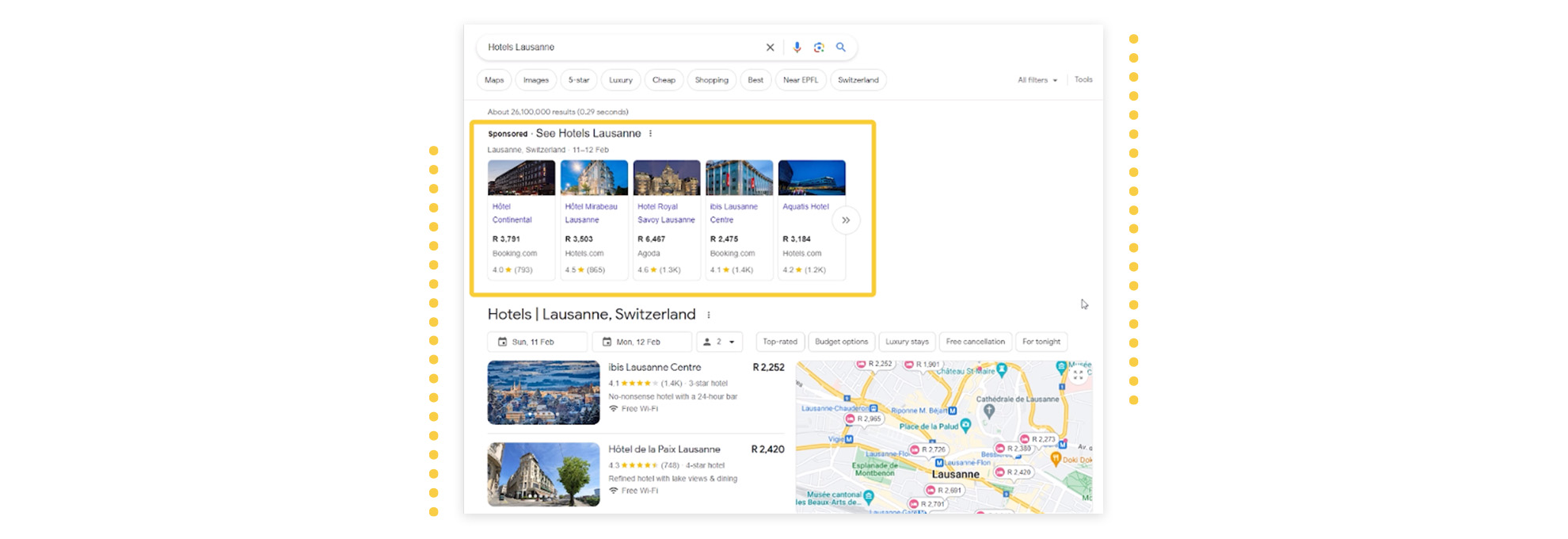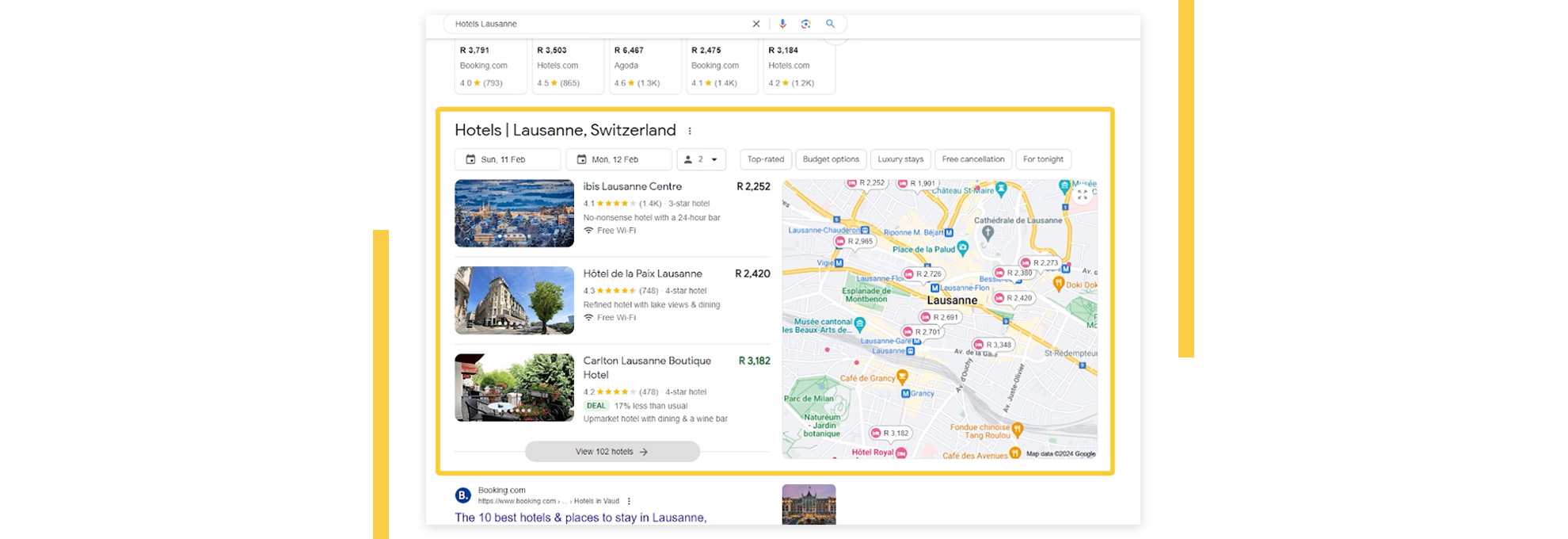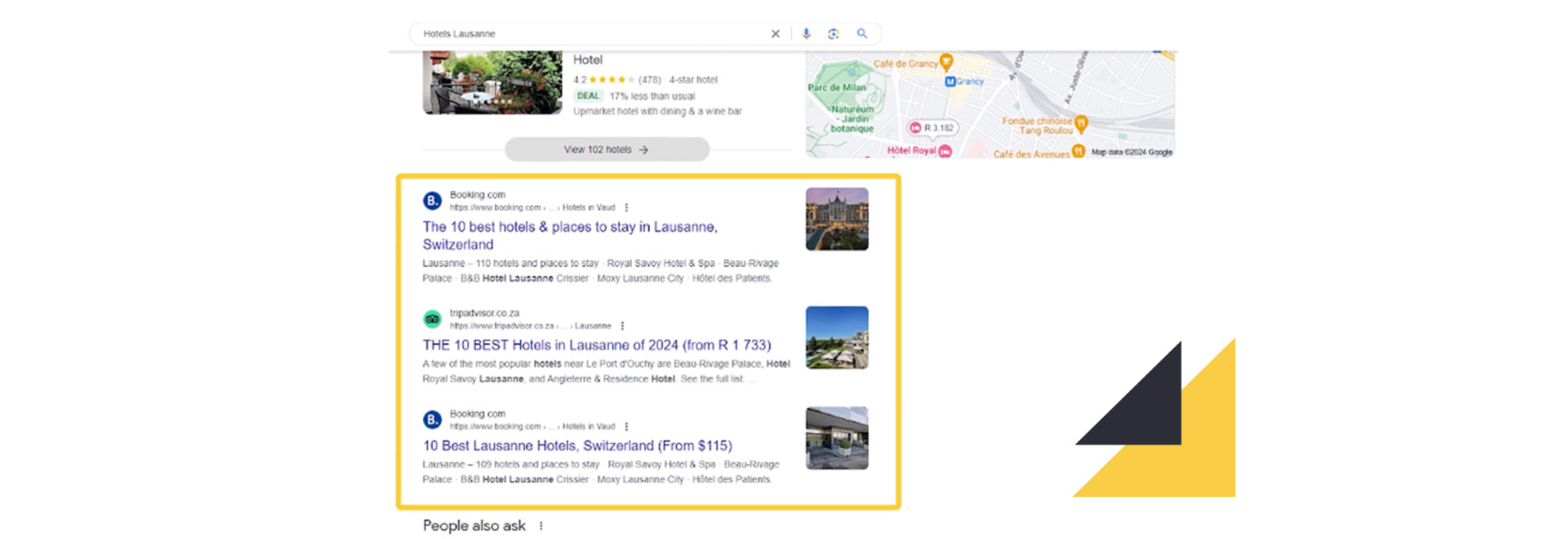
What are Google Hotel Ads? What different advertising formats are there and how do they differ? And how do Free Booking Links play a role? Discover all of this as well as the best strategies for your hotel to leverage these resources effectively.
With Google Hotel Ads, pay-per-click, free booking links and more, it's easy to get overwhelmed.
But fear not, the world of hotel ads isn't as complicated as it seems.
In this article you will find the most important basics explained in a simple way.
Take a look and gain an overview so that you can get the most out of the various options.
It's worth it, as Google is now a vital part of travel planning for all age groups and guest segments!
Google as an integral part of the guest journey
Google is now an indispensable element of the guest journey. Even if travelers don't start with the search engine right away, most end up using Google sooner or later during the planning process.
There's a good reason for this. The search giant serves as a good starting point, allowing all travelers to search according to their preferences.
This is also great news for hotels. Google offers the opportunity to be visible to your target group at every stage of the research and booking process.
This can be achieved organically through search results, or with a little help, through Google Hotel Ads, for example. The goal is to further enhance your visibility and generate more direct bookings.
Now let's explore the options available and how best to utilize them.
Hotels on Google: What potential guests see
When someone searches on Google for hotels in a specific region or city, the first results are always paid ads.

Ads are easy to recognize as they are labeled with “Ad” or “Sponsored”.
Next comes the Google Hotel Finder with several hotel profiles and a country or city map.

These are followed by organic results. They usually include links to the major OTAs, best-of articles in travel magazines and hotel websites.

It's a different story when people specifically search for a specific hotel or brand. Here, again, paid advertising is at the top but is often followed directly by the hotel's own website (as long as it has been correctly optimized for search engines).

After the initial results, Google also displays a price calendar for the requested hotel as well as additional organic listings.
At the top right, the hotel's Google My Business profile is prominently featured, providing users with your contact information, website link and other essential details about your hotel. This is followed by Google hotel ads, frequently asked questions and guest reviews.
An optimized and well-maintained hotel profile, along with hotel ads, presents a great opportunity to bring searchers directly to your website. Let's take a closer look at these two elements.
Your hotel profile on Google
Your hotel website appears organically in the search results if it matches the user's search query. Unfortunately, you will only rarely be at the top. Various OTAs often secure the top positions, pushing your website further down.
It is therefore essential to create a free Google My Business profile for your hotel to actively improve your chances of visibility. You can store all the necessary information about your hotel there, such as the website link, images, contact details, amenities, prices and availability. Searchers can click directly through to your website from this profile to make reservations.
Google Hotel ads: The basics
The next step to enhance your visibility is to utilize Google Hotel Ads. These ads list your prices, availability and conditions when someone searches for hotels like yours. They appear in the form of a booking link within the Google Hotel Finder when someone clicks on your hotel in the search results.
You can share your availability and prices with Google in various ways:
-
Add it manually to your profile: This requires manual updates, especially for price and availability changes, which can run the risk of rate disparities or overbookings.
-
Automatically through a partner: A channel manager like Hotel-Spider supports integration with Google, transmitting your data in real time. This gives you more flexibility and control, ensuring rate and availability updates are always automatically communicated.
All providers with access to your inventory can list such a booking link for your hotel, including OTAs and of course you yourself if you work with a partner like Hotel-Spider with a direct connection to Google. When users click on it, they are redirected to the respective provider.

On the left you can see different results for hotels in Zurich. On the right is the profile of the selected hotel, followed by the Google hotel ads of the channels where the hotel can be booked. The first entry here is the hotel's own website.
The special thing here is that you can display the direct link to your website for free. These free booking links are a real bonus, especially if you are working with a tight marketing budget. However, they appear below the paid links and therefore receive fewer clicks.
If you want to be at the top (like the hotel in our example), you need to run Google hotel ads
What really matters with Google Hotel Ads
No matter which option you choose, a few points always remain crucial to succeeding with Google Hotel Ads.
“Determining which option works best for your hotel isn't something you can predict in advance. Ideally, you should collaborate with an experienced partner who can steer your ad campaigns in the right direction. Then test different approaches and keep optimizing,” suggested Thierry Geissmann, founder of the dig.id Switzerland agency, in a recent interview on the Hotel Spider livestream
Here's a quick summary of the most important ones:
-
Target the right audience: Take the time to research who is currently searching and what matters to these travelers. This allows you to fine-tune your ads to reach the right people. Skipping this step and attracting clicks from the wrong audience can quickly burn through your budget with little to show for it, especially in the CPC model.
-
Polish your ad and profile content: Good images and descriptions are essential. Ensure that all information is up-to-date and your photos showcase your property at its best. This attracts more attention to your hotel and leads to more clicks.
-
Check the technology in the background: Reservations cannot be made directly through Google. Customers need to click through to your website to make reservations. That's why a fast, mobile-friendly booking engine is essential Good content and a secure, quick payment function are also important here.
-
Build a solid foundation: Set up your tracking correctly from the start before getting started. This way you can always keep track of expenses, clicks, impressions, bookings and revenue. Otherwise, you risk wasting a lot of money quickly.
-
Analyze results and continuously optimize: What did you achieve with your last campaign? What could you improve? Work through each point step by step and measure how changes impact your results.
With these points in mind, you are well-equipped to dive into the world of Google hotel ads. It may all seem a bit confusing at first, but you'll soon gain a solid understanding. And it definitely pays off.
Aldin Basic, co-founder and CMO of Ezy Hotels aptly put it in a recent livestream “Be sure to try out Google's various solutions, as more and more people use Google's travel platform to plan their next vacation. If implemented correctly, you can significantly increase your visibility and recoup your advertising spend many times over.”
And if you still have questions, don't hesitate to reach out to us We're here to help.


